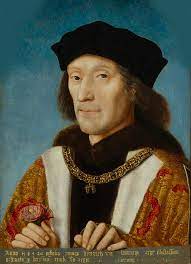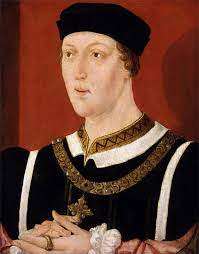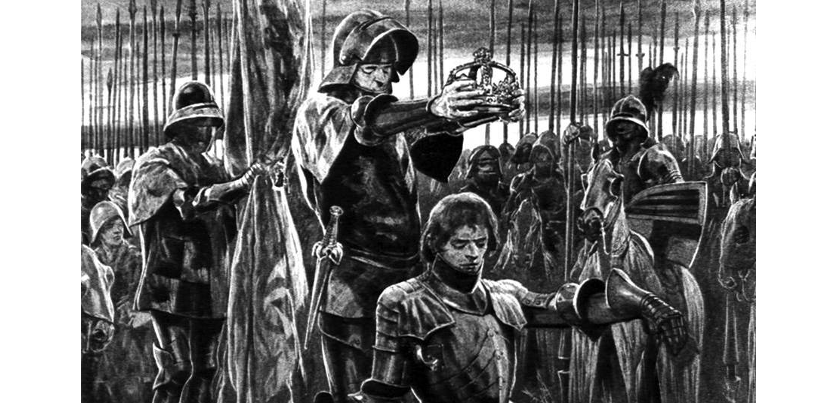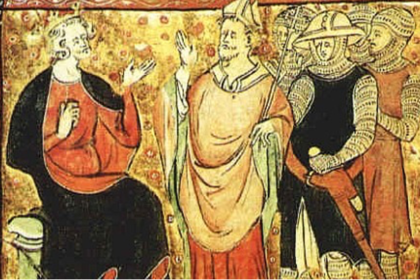Henry VII’s claim to the throne of England was tenuous at best; he was descended from illicit unions on both sides of his family tree. His mother was a Beaufort, a descendant of John of Gaunt and his mistress, Katherine Swynford – although they later married and their children made legitimate, they were explicitly barred from the succession. His father was the son of Queen Catherine, the widow of Henry V, who had taken a member of her household, Owen Tudor, as her lover and husband.

So when Henry came to the throne, it was incredibly important to bolster his claim. He did this in many ways, including his marriage to Elizabeth of York, the imagery of the Tudor rose, and naming his son Arthur, after the legendary king of the Britons.
This was an endeavour which he continued throughout his reign; the pretenders and rebellions he faced forced him to continually reaffirm his legitimacy as king. As late in his reign as 1505, he commissioned humanist scholar Polydore Vergil to write a history of England, a history which would justify Henry’s reign and dynasty. Though he didn’t live to see it completed, it nevertheless is very revealing of Henry’s anxieties and the legacy he wanted to embody.

The fulfilment of this was Vergil’s ‘Anglica Historia.’ Whilst the entire narrative of this text is framed to bolster the Tudor claim, there is one aspect I wish to focus on, namely, that Henry VII’s reign was foretold.
Book III tells of the Roman departure from England and the early history of the English people (including Arthur). One the figures is Cadwaladr, historically a 7th century king of Gwynedd in Wales, but mythologically the last of the ancient kings of Britain. Polydore relates a vision Cadwaladr had:
‘King Cadwallader was oppressed with hardships of this kind, and, together with a good number of his fellow countryman he took ship for Britanny on the Continent. And there, soon thereafter, he collected no small army and, having been informed that the pestilence had now departed the island, he prepared himself for return, when behold, a superhuman apparition appeared to him in a dream, saying, ‘I tell you, king, cease making war, by that you cannot resist fate. Your nation is destined to fall into the power of its enemy, far in the future your posterity will recover it.’ It is wonderful what great faith Cadwallader had in these words, who (as they say) saw silver turned into dross, and immediately cast down his weapons and ordered those Britons he had led into Gaul to return home.’
(Igitur rex Cadovalladrus posteaquam se confirmaverat eiusmodi difficultatibus pressus cum bene magno suorum numero in Brittanniam continentis traiecit, ubi statim post, conflato non mediocri exercitu, ac certior factus pestilentiam de insula iam abiisse, ad reditum se parabat, cum ecce tibi, imago quaedam prae se ferens vultum praeter mortalem per quietem ita ei fata esse dicitur: ‘Tibi dico, rex, desine arma movere, quippe quibus ne quidem potes fato resistere. Casura est prorsus patria in hostis potestem, quam tua longo post tempore progenies recuperabit.’ Mirum est quantum fidei iis vocibus Cadovalladrus habuerit, qui videns iam argentum, ut aiunt, versum esse in scoriam, abiectis confestim armis, iussit Britannos quos in Gallias duxerat domum redire.)

Though Henry VII is not explicitly mentioned here, what the audience was supposed to see was a Welshman receiving a vision that his descendants would rule England, a clear reference to the Welsh Henry VII.
Polydore builds on this theme in Book XXIV, which relates the back-and-forth reigns of Edward IV and Henry VI. Though his detractors regarded him as a weak and ineffectual leader, many saw Henry VI as a saintly figure; in fact, it was only the English Reformation that got in the way of his canonisation. So when reading Vergil’s version of a meeting between Henry VI and a young Henry, only Earl of Richmond at this point, it is important to bear in mind the weight that was given to the words of a holy man:
‘At the same time Earl Jasper of Pembroke returned to his earldom in Wales, where he found Henry, the son of his brother Earl Edmund of Richmond, a boy of scarce ten years, to be held captive but otherwise being well reared by the wife of William Herbert…And so Jasper took the little Henry from the wife of Lord Herbert and took him to King Henry when he returned to London a little later. It is said that the king, seeing the boy, held his silence for a while, studying his character, and then said to the nobles who were present, ‘This indeed is the one to whom we and our adversaries must yield our power.’ Thus this pious man predicted that someday Henry would obtain the crown.’
(Per idem tempus Gaspar comes Penbruch reversus est in Walliam ad comitatum suum, ubi reperit Henricum Edmundi comitis Richemondiae fratris filium, vix decimum agentem annum, ut captivum custodiri, caeterum liberaliter educari apud uxorem Gulielmi Harbarti…Gasper itaque puerum Henricum ab uxore reguli Harberti accepit eumque secum aliquanto post Londinum rediens ad Henricum regem duxit. Rex ubi puerum vidit aliquantum tacitus illius altam indolem contemplatus principes qui aderant sic affatus dicitur: ‘Iste nempe iste est cui nos ac nostri adversarii rerum possessione cedemus.’ Ita vir sanctus praedixit futurum ut Henricus quandoque regni potiretur.)

Finally, in Book XXVI, Polydore shows Henry VII fulfilling the divine prophecies of his forebearers:
‘Thus Henry gained the throne, as had been preordained by God’s will and plan, since, as I have recalled earlier, 797 years previously Cadwallader had forecast that his stock would reign once more. Men’s minds had already been gripped by the belief that Henry had been brought to the throne by this prophecy, and Henry VI had also predicted it.’
(Henricus sic regnum adeptus est quod Dei nutu atque concilio provisum est, quamdo abhinc ex hoc anno salutis 1486 annos dccxcvij memoriae proditum fuerit vocem divinitus Cadovalladro ultimo Britannicorum regi, ut supra memoravi, redditam eius progeniem rursus regnaturam. Istius vocis fato Henricum ductum regnum obtinuisse opinio per animos hominum iampridem pervaserat, quod et Henricus Sextus futurum praedixerat.)
Clearly, there is absolutely no evidence that either of these prophecies were actually made, but they played into the popular mythologised history of England and religious cult beliefs of the day. Whether anyone actually believed Vergil’s inventions is hard to say; they did not become entrenched elements of the Tudor story. However, they did contribute to the overall stability of the Tudor regime. This skill for branding and mythologising is one that Henry shared with his granddaughter, Gloriana, the Virgin Queen.





